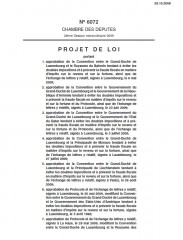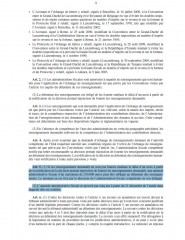11/13/2009
White liste: the OECD charade is going on
Liechtenstein and Singapore have passed into the "OECD's whitewash, sorry, white list category" (TJN wording).
Liechtenstein scored an 87 percent opacity score and Singapore scored a 79 percent opacity score on TJN Mapping the Faultlines project.
Thanks to Luxembourg - the first jurisdiction that was congratulated - and its draft law to enforce the OECD agreements, everyone now knows that there is a huge loophole in the enforcement of the agreements: the creativity of jurisdiction to bypass agreements.
Luxembourg has imagined the "discharging fine", that would allow practically banks to keep secrecy and make money thanks to a possible new service that could be charged to clients.
12:19 Posted in General | Permalink | Comments (0)
11/11/2009
Maximum Eur 250,000: the price to bypass tax agreements in Luxembourg?
A draft law is before the Chambre des Députés (Luxembourg legislature) to enforce agreements that Luxembourg signed based on OECD's Model Agreement on the Exchange of Information on Tax Matters.
The text states that the Luxembourg tax administration
- will examine the requests from foreign tax administration to assess if they comply with the law and the agreement, and if so
- will request officially (registered letter) the data from the entity.
Should the entity not provide the data within one month, it would be fined up to EUR 250,000 by the Luxembourg tax administration, on the director's discretion.
What does that mean from a practical point of view?
1. A fine is not coercive: why not introduce a criminal liability and authorise an investigation to look for the data?
2. This amount of EUR 250 000 is ridiculous when one knows the amounts of tax evasion and anyway is a maximum that will never be fined (See administrative fines by CSSF).
Above all, this fine is actually a way to bypass the agreements based on the OECD tax model. Luxembourg bankers are very creative. One can imagine a new service for clients that would be charged a fixed price of EUR 250,000 for the bank to keep secrecy ; and I do not think a new request from foreign tax administration on the same data will be accepted.
I will quote again ALFI in a recent brochure knoking that it is true as well for ABBL:
« Shape regulation. An up-to-date, innovative legal and fiscal environment is critical to defend and improve Luxembourg's competitive position as a centre for the domiciliation, administration and distribution of investment funds. Strong relationships with regulatory authorities, the government and the legislative body enable ALFI to make an effective contribution to decision-making through relevant input for changes to the regulatory framework, implementation of European directives and regulation of new products or services. »
(Source ALFI brochure: " Your bridge between Europe and China: Luxembourg".
This draft law is perfect implemnetation of that "influence" and explain the reason why many professionals communicate that the agreements do not change things for clients:
- money of evasion will be accepted
- there is a way in the law to keep secrecy
Let's read again what Angel Gurria said in the OECD press release dated 8 July 2009: “I commend Luxembourg for its swift implementation of the OECD standards on exchange of information. In three months, Luxembourg has turned into reality its commitment to fully cooperate in tax matters. I would like to congratulate Minister Luc Frieden for his leadership in this process”.
Fully cooperate ?
I wonder what is OECD's opinion (Pascal Saint Amans and Angel Gurria's opinion) about that?
09:45 Posted in Luxembourg | Permalink | Comments (0)
11/10/2009
UK Regulator v. Luxembourg Regulator
The Financial Services Authority (FSA) fined UBS AG (UBS) £8million for systems and controls failures that enabled four employees to carry out unauthorised transactions involving customer money on at least 39 accounts. The £8m fine is the third largest the FSA has ever imposed.
The FSA investigation found that UBS had failed to:
- manage and control the key risks, and the level of risk, created by its international wealth management business model;
- implement effective remedial measures in response to several warning signs that suggested the business' systems and controls were inadequate; and
- provide an appropriate level of supervision over customer-facing employees.
By the way, what was the pragmatic solution for UBS in Luxembourg in the context of the Madoff affair, with issues similar to the ones that are fined by FSA (poor execution of the due diligence obligation, failure of human and technical means and of internal rules) ?
Let's read again a press release from CSSF and the happy end in another press release:
On 25 February 2009 the Commission de Surveillance du Secteur Financier (the "CSSF") ordered UBS (Luxembourg) SA ("UBSL") to implement, within a period of three months, the necessary infrastructure, i.e. sufficient human and technical means and the necessary internal rules in order to fulfil all the tasks relating to its function of depositary bank of a Luxembourg UCI in accordance with the Law of 20 December 2002 on undertakings for collective investment, as amended, and Circular IML 91/75, and to provide evidence and guarantees thereof.
After several updates of a draft, UBSL submitted to the CSSF by post dated 25 May 2009 a final detailed report regarding improvements made to its infrastructure and substantial amendments to its internal procedures relating to the function of depositary bank. After analysing said report, the CSSF is of the opinion that UBSL has now delivered evidence and guarantees of having the necessary infrastructure and the necessary rules for its internal organization in place, in line with the injunction imposed on it and in compliance with professional standards applicable in the Grand Duchy of Luxembourg.
07:28 Posted in Comparison | Permalink | Comments (0)








